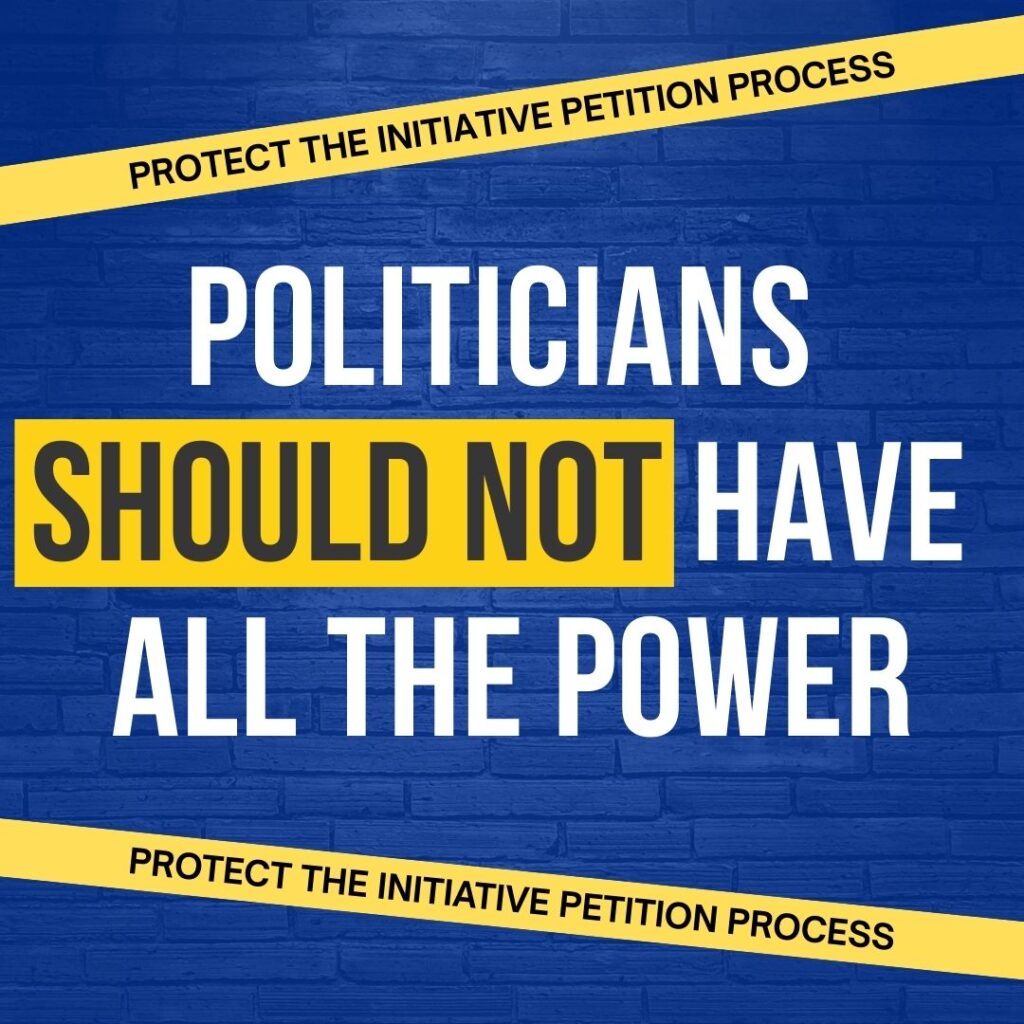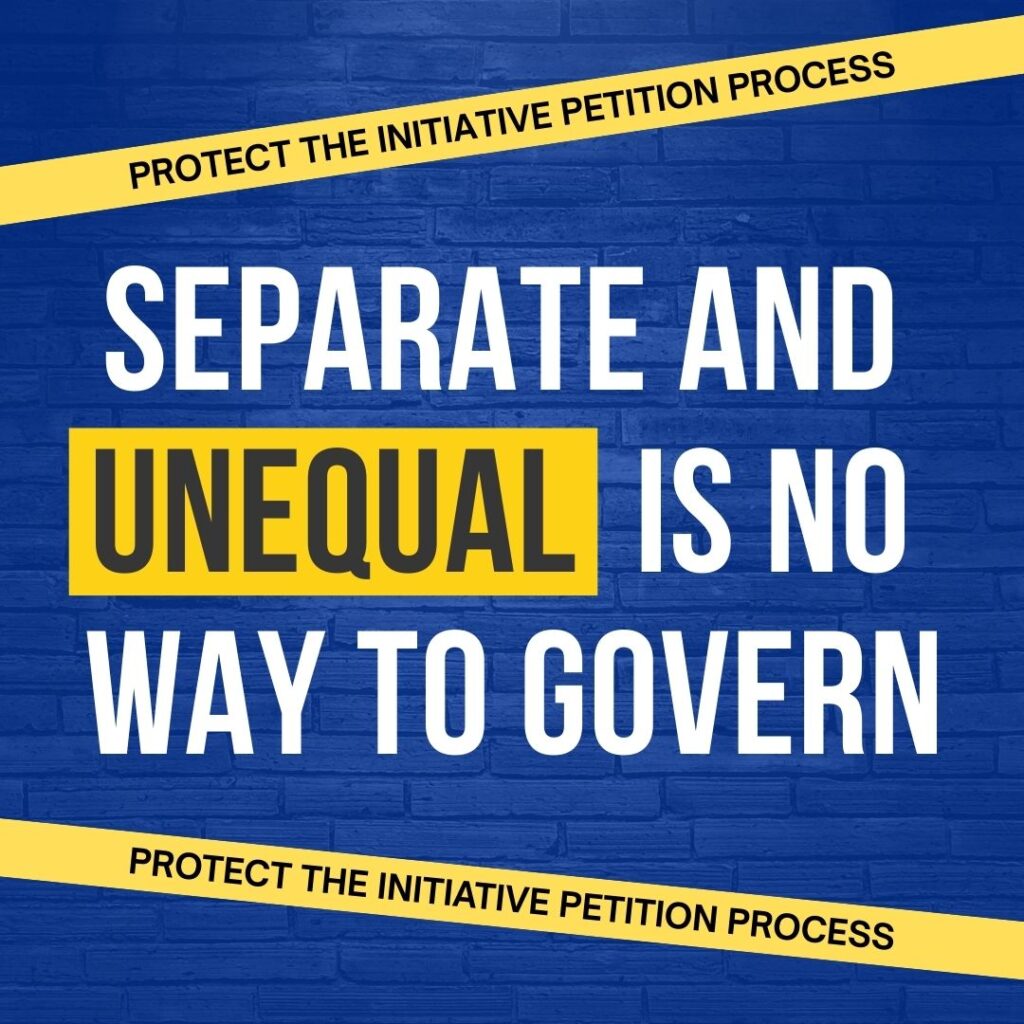On Friday afternoon, after 4PM, ahead of the long holiday weekend, Governor Mike Kehoe announced that he was calling a special session to “enact legislation establishing updated congressional districts for the State of Missouri and amending the state’s initiative petition process.” This is a political move called “taking out the trash,” which refers to the strategic release of unpopular news when the general public is focused on other things to minimize public scrutiny.
We’re back from the holiday weekend, and this special session deserves maximum public scrutiny, so let’s get into it. While many Missouri advocates are rightfully focusing their attention on the issue of redistricting, we’re focusing our attention on the Governor’s call for changes to the state’s initiative petition (IP) process. This isn’t to say that we’re okay with the redistricting provisions. Gerrymandering is always wrong, has always been wrong, and will always be wrong. It’s wrong when Republicans do it, and it’s wrong when Democrats do it.
Our Founding Fathers foresaw this moment and attempted to set the United States on a different path. Alexander Hamilton called political parties “the most fatal disease” of popular governments. President George Washington, in his farewell address, stated, “The common and continual mischiefs of the spirit of party are sufficient to make it the interest and duty of a wise people to discourage and restrain it.” I can only imagine what they would think to know that political parties now draw district lines to create electoral advantages for themselves. A lack of competitive districts nationwide has disenfranchised millions of voters and contributed to more than one-third of adults simply not participating in our elections. It’s a substantial problem that will require hard work and commitment from advocates not only in Missouri, but across the country, to solve.
However, for today, we’re going to focus on the other piece of legislation being considered during this special session. Empower Missouri has a long history of fighting to defend the state’s initiative petition process. Let’s start with a quick primer on the system for those who are unfamiliar. The initiative petition process is a right enshrined in Missouri’s constitution, Article III, Section 49:
“The people reserve power to propose and enact or reject laws and amendments to the constitution by the initiative, independent of the general assembly, and also reserve power to approve or reject by referendum any act of the general assembly …”
Our state’s founders built this critical mechanism for citizens to enact policy into our state constitution. Our legislators work for us. And when they don’t advance policy as we see fit, we have the right to bring important proposals directly to the people. In the last decade, we have used the initiative petition process to authorize Medicaid expansion, prohibit new sales taxes, legalize medical (and then recreational) marijuana, raise the minimum wage (twice), and legalize sports betting. Here’s how it works:
- The Petition: A petition is created and filed with Missouri’s Secretary of State. The SOS, Attorney General, and State Auditor all have roles in reviewing and approving for accuracy, fairness, and the legality of the content.
- Collection of Signatures: According to RSMO 116.080, petition circulators must be 18+, registered with the SOS, have no forgery convictions, and must sign a notarized affidavit swearing they witnessed every signature.
- Signature Requirements: Signatures must be collected from at least 2/3 of Missouri’s Congressional districts (6 of 8). Signatures are collected from only Missouri registered voters. For constitutional amendments, circulators must collect a number of signatures greater or equal to 8% of voters casting a vote in the last gubernatorial elections in at least 6 out of 8 districts. Based on 2024 voter turnout, circulators will have to gather over 170,000 signatures to place an initiative petition on the ballot in 2026.
- The Vote: If enough signatures are collected and certified by the SOS, the proposal is presented to Missouri registered voters on the next statewide ballot. A simple majority vote (50%+1) is needed for approval.
The initiative petition process is one of two ways that Missouri’s constitution can be amended. Legislators can also propose changes to the constitution by passing legislation that then goes before voters for approval. The constitution cannot be changed without voter approval. Over the last 115 years, here’s how that breaks down by the numbers:
- 322 constitutional amendments have been proposed to voters
- 250 of those proposals (78%) were submitted by the legislature
- 72 of those proposals (22%) were submitted by the citizenry through IP
- 189 constitutional amendments were approved by voters (59%)
- 159 of those constitutional amendments (85%) were proposed by the legislature
- Only 30 (15%) were proposed via the IP process
Yes, you read that right– over 115 years, Missouri citizens have only amended Missouri’s constitution 30 times using the IP process. So, why is this a process that needs changing?
Governor Kehoe’s call for a special session states that he is seeking five changes to the process. In the table below, we break down each proposed provision:
| Proposal | Empower Missouri’s Assessment |
|---|---|
| Bans foreign nationals from contributing to committees for or against a statewide ballot measure. | These first two proposals are what politicos refer to as “ballot candy.” They are proposals that most people would agree with, but are almost always a solution in search of a problem. We have seen no evidence that foreign nationals are involving themselves in our ballot measures and no evidence that signatures are being gathered fraudulently. So why is it a problem to include these provisions? Because they are included as a distraction, usually at the top of the list, with hopes that voters will just skim the ballot language and miss the meat of the issue. |
| Establishes a criminal election offense for fraudulently signing or gathering signatures for a statewide ballot measure. | |
| Requires that before a statewide ballot measure is certified for signatures to be gathered, there shall be an opportunity for public comment. | We don’t necessarily oppose this idea– more public input is always good! But, what’s the point of including it? Can something that happens during public comments change whether or not the petition is certified for signature gathering? If not, what’s the point? |
| Requires that the full text of a statewide ballot measure be printed and available to voters at all election sites and polling places. | This seems like a perfectly acceptable idea. Let’s do it! |
| Provides that a statewide ballot measure be passed only if a majority of voters statewide and a majority of voters in each congressional district vote to adopt the proposed measure. | This is the crux of the issue at hand. This is the only component of the bill that matters. Everything else is smoke and mirrors. Missouri’s legislature will be debating a proposal to require not only a simple majority (50% +1), but also a majority in every single congressional district. |
Here’s the most important thing that you need to know about this proposal: the new rule that constitutional amendments need to be approved by a majority of voters in each and every congressional district ONLY applies to amendments that are proposed by the people through the IP process. It would NOT apply to constitutional amendments proposed by the legislature. They will still be able to pass amendments with only a simple majority statewide. Why? Because they know that it will make it virtually impossible to pass anything under this new rule– and they don’t want that to apply to their ideas, only ours.
I would love to be able to show you data that demonstrates how this provision of the bill would drastically undermine our ability to amend the constitution, but sadly, I can’t. Voting data isn’t available by congressional district to see how many previous amendments would have passed with this provision. But, my educated guess would be zero. We live in deeply divided times, and many of these initiatives passed by thin margins statewide. It’s highly unlikely that they also passed in all eight Congressional districts.
And that’s the point. Too many of Missouri’s elected officials simply do not respect the will of the voters. They proved it in the Spring when they overturned paid sick leave and voted to send abortion rights back to the ballot. They proved it when they sent Clean Missouri back to the ballot and overturned it using deceptive ballot language. And they proved it when they spent years trying to find a way to overturn Medicaid expansion. And they are proving it again by attempting to create a separate and unequal system for passing constitutional amendments in Missouri.
Governor Kehoe ended his statement by stating, “For far too long, Missouri’s Constitution has been the victim of out-of-state special interests who deceive voters to pass out-of-touch policies.” Really, Governor? Preventing new sales taxes (passed by IP, 2016) is an out-of-state interest? Legalizing marijuana (passed by IP, 2018 and 2022) and saving taxpayers millions of dollars spent on locking people up on petty drug charges in an “out of touch policy?” What about expanding healthcare access to working class Missourians (passed by IP, 2020)? Is that an out-of-state special interest or an out-of-touch policy?
Enough is enough. The initiative petition is our constitutional right as Missouri citizens, and no one should have the desire to take it from us. Use our Call to Action to tell your legislators that we don’t want any changes to our IP process.
Help us spread the word! Use these graphics and share our Call to Action to tell your friends to contact their legislators now:


You can hear more about the Special Session from our Executive Director, Mallory Rusch, Chief of Policy Staff, Lucas Caldwell-McMillan, and Advocacy Director, Sarah Owsley, on a special episode of our podcast, Under the Dome,.
